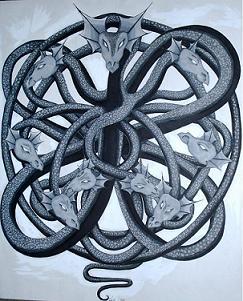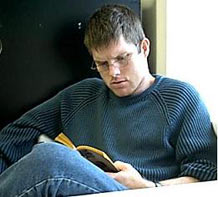 Sunday, July 01, 2007
Sunday, July 01, 2007
Letter to my wind sextet.

Dear Hydra,
I apologize. I have spoken ill of you for about two years now. I was convinced you were sub-par and ill-conceived. I even asked your dedicatee to forget about you. I had ideas of cutting you up and rearranging you into a new work, but not anymore.
Although your first performance was mediocre at best, I feel that you have yet to reach your prime. I have listened to the premiere performance with a score several times this weekend and I am deeply sorry for my past words. I realize all the charm you posess. I was blaming you for the mistakes of a few performers, and now I regret it. So now I wish you a long life and many great performances. All the best, Everette Minchew
posted by Everette Minchew
1:25 PM
|
|
 Composer Everette Minchew (born 1977) is consistently active in the creation, performance, and promotion of contemporary music. Moderately prolific, his catalogue includes small chamber pieces for violin, piano, various wind instruments, harpsichord and electronic music. Current commissions include a string trio and an opera based on an 11th-century crusades tale.
His earliest musical training came at the age of eleven when he began playing alto saxophone; it wasn?t long until he began his first attempts in composition.
Composer Everette Minchew (born 1977) is consistently active in the creation, performance, and promotion of contemporary music. Moderately prolific, his catalogue includes small chamber pieces for violin, piano, various wind instruments, harpsichord and electronic music. Current commissions include a string trio and an opera based on an 11th-century crusades tale.
His earliest musical training came at the age of eleven when he began playing alto saxophone; it wasn?t long until he began his first attempts in composition.
He received a Bachelor?s Degree in Music History from the University of Southern Mississippi, where he studied saxophone under world-renowned soloist, Lawrence Gwozdz.
Fearing that traditional university training would hinder his development as a progressive composer, he abandoned the idea of formal lessons in favor of an intense private study of modern masterworks.
Minchew's works are characterized by their intense timbral explorations and brutal dissonance. That is not to say, however, that the compositions are devoid of beauty. In the first of the Two Brief Pieces, for example, the harpsichord chimes stringent yet haunting chords evoking a sense of loss.
Other pieces, like the Figment No. 2 "Juggler's Fancy" play upon the kaleidoscopic interaction between timbres and tones. The rapid alternation of pizzicato, arco bowing, and extreme glissandi remind the listener of Xenakis coupled with a Berio Sequenza. Minchew's Invention "Two-Part Contraption" for piano owes much to Ligeti's etudes and boogie-woogie jazz.
His music has been performed around the United States, and he was the featured composer at the 2005 Intégrales New Music Festival in Hattiesburg, Mississippi.
He currently resides in Hattiesburg, Mississippi with his wife, Cheryl.
CONTACT INFORMATION
| |



